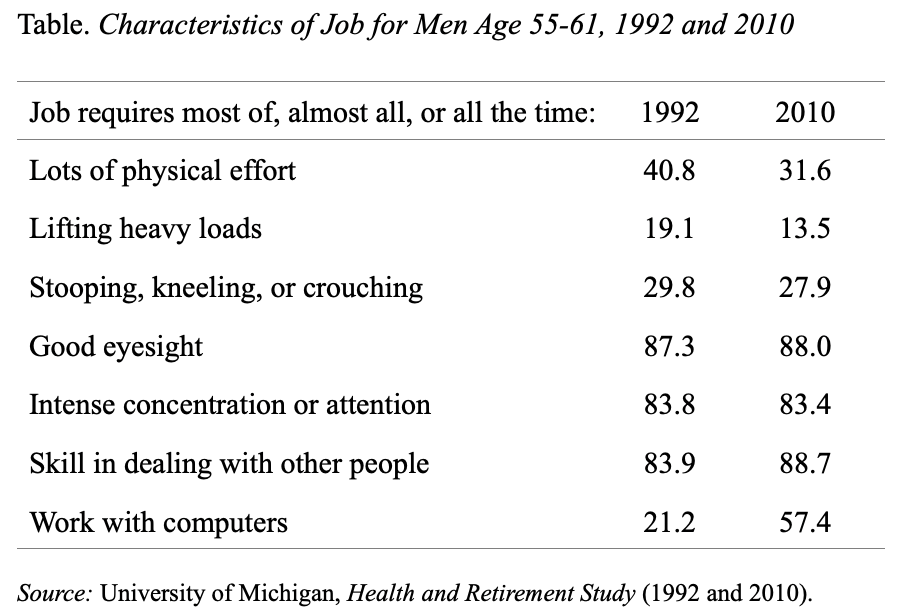
Yes, Jobs Are Less Demanding
Alicia H. Munnell is a columnist for MarketWatch and senior advisor of the Center for Retirement Research at Boston College.
The bulk of older workers should be able to work longer
My standard argument is that retirement needs are increasing as people live longer and face rapidly rising health care costs. At the same time, the retirement income system is contracting as Social Security replacement rates decline even under current law, employer-sponsored plans move from defined benefit to defined contribution with modest benefits, and people save little on their own. The only way to square this circle is for people to work longer. This, I say, should be feasible given that people are living longer, are healthier in their sixties, and that jobs are less physically demanding.
The assertion that jobs are less physically demanding is based on the fact that the economy has shifted from one based on manufacturing to one based on services. In fact, manufacturing did decline from 26 percent of total male employment in 1980 to 14 percent in 2010. But the question remains whether older workers view their jobs as less physically demanding than in the past.
The Health and Retirement Study (HRS), a nationally representative survey of older Americans, provides a base for answering that question. The first survey was conducted in 1992 for individuals age 51-61 and their spouses of any age. These people have then been re-interviewed every two years and new cohorts added over time. One of the questions asks about the requirements of the person’s job.
The first part of the question was whether the job requires “lots of physical effort” 1) almost all, or all of the time; 2) most of the time; 3) some of the time; or 4) none or almost none of the time. The table combines the first two categories for men age 55-61 in 1992 and 2010. Over the 18-year period, jobs requiring lots of physical effort declined noticeably. The need to lift heavy loads also went down. Stooping, kneeling or crouching declined only modestly, perhaps because these tasks are required in retail jobs. The requirements of good eyesight and intense concentration were essentially unchanged, while skill in dealing with other people went up. A big increase occurred in the need to work with computers.

It would be nice to have similar information for people at older ages, but that is not possible with the HRS, because the original sample included only a few spouses who were over the age of 61 – too small a group for meaningful results.
In my view, the responses say two things. On the one hand, it is correct that the physical requirements of jobs have declined over time, and the decline would be even greater if the data went back to the 1980s. The bulk of older men should be able to work longer than they have in the past. On the other hand, as recently as 2008, roughly a third of men 55-61 reported that their job requires “lots of physical effort.” This group may not be able to work – at least in their current job – beyond their earlier sixties. Any plans for delayed retirement need to take both groups into account.







